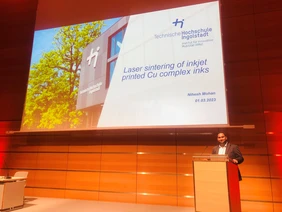Our modern, digitalized world is inconceivable without electronics. Sustainability in electrical engineering is therefore an important goal that can be achieved with various approaches: On the one hand, through the use of bio-based and biodegradable plastics and, on the other hand, through the extensive recyclability of electronic circuits.
The AGE research project is investigating the use of bio-based and recyclable polyamide-4 (PA-4) - also known as nylon - for printed circuit board technology. The nylon is produced from plastic waste in the Future Material Laboratory at UniSQ. At THI's Institute for Innovative Mobility, flexible circuit carriers are produced based on this bio-nylon. First, the liquid nylon is sprayed on as a thin layer and dried. Then the conductive tracks made of environmentally friendly metal salts are applied using an inkjet printer. In the research project, the technology is to be used and demonstrated for a ‘Health Monitoring Sensor’ as part of the ‘Bio-Electronic Engineering’ degree program to closely link research and teaching.
Further information on the project can be found at:


![[Translate to English:] Logo Akkreditierungsrat: Systemakkreditiert](/fileadmin/_processed_/2/8/csm_AR-Siegel_Systemakkreditierung_bc4ea3377d.webp)








![[Translate to English:] Logo IHK Ausbildungsbetrieb 2023](/fileadmin/_processed_/6/0/csm_IHK_Ausbildungsbetrieb_digital_2023_6850f47537.webp)


